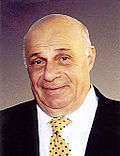History
The Republic of Cyprus was established in 1960 after independence was achieved from British colonial rule, and its constitution came into force that shared power between the two major ethnic groups on the island, as established under the London and Zürich Agreements.
Fazıl Küçük became the first vice president of the country, running unopposed in the 1959 election and winning reelection in the 1968. Rauf Denktaş ran unopposed in the 1973 election, becoming the second vice president.
The vice president appoints three ministers to the cabinet, yet due to disagreements amidst intercommunal violence, such appointments were not made and Turkish Cypriots have not participated in the government since December 1963. [2]
Vice president Denktaş, along with President Makarios III, was deposed via coup d'état by a Greek nationalist junta backed by Greece. Turkey responded by invading the island. Makarios III was restored upon the collapse of the military junta, but Turkish troops refused to leave the island. Later they would establish the Turkish Republic of Northern Cyprus, with Denktaş as its president. Greek Cypriots fled south and Turkish Cypriots fled north. The island remains divided to this day, despite the United Nations and the international community urging an end to what is considered the Turkish occupation, and urging the restoration of the recognised borders of Cyprus.
This page is based on this
Wikipedia article Text is available under the
CC BY-SA 4.0 license; additional terms may apply.
Images, videos and audio are available under their respective licenses.



